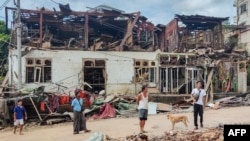Despite efforts by China and the Association of Southeast Asian Nations (ASEAN) to resolve Myanmar's political and economic crisis, opposition leader Zaw Wai Soe told VOA that dialogue with the military regime is impossible amid ongoing atrocities.
Zaw Wai Soe is a minister in Myanmar’s National Unity Government (NUG), a shadow government of former lawmakers and opponents created after the February 2021 coup.
“The military must have no place in politics,” he said.
Speaking to VOA in Washington after attending the U.N. General Assembly in New York in September, Zaw Wai Soe commented on opinions that humanitarian aid to victims of Typhoon Yagi in early September could provide a political way out.
"They continue to drop bombs, and it is obvious they are committing war crimes," he said. "It is impossible to engage in dialogue with such an organization."
The military has appealed to the opposition to negotiate. According to Tu Maung Nyo, a political columnist based along the Myanmar-Thailand border, the military’s recent calls to end the conflict indicate an attempt "to achieve on the table what they cannot accomplish on the battlefield." He added, "This approach has been used repeatedly whenever the military faces political or military crises."
On October 15, Senior General Min Aung Hlaing, Myanmar's military leader, called on ethnic rebel groups to engage in peace talks to end armed conflicts, marking the second appeal for negotiations in less than a month.
Military’s view on crisis
VOA contacted Myanmar's military regime, the State Administration Council (SAC), to comment on Zaw Wai Soe's statements but did not receive a direct response at the time of publication.
In September, in an effort to start peace talks, SAC spokesperson Zaw Min Tun told the media that "the military is committed to solving political problems through political means."
The day after, the military made its first public appeal since the coup, calling on its opponents, including the People’s Defense Force, to lay down their weapons and return to the political process to end the country's conflict. SAC urged ethnic armed organizations and "terrorist insurgent groups" to "communicate with us to solve political problems politically” and participate in the military-managed election it plans to hold next year.
Doubts over cease-fire
Analysts and critics question the sincerity of the military's calls for peace, given its ongoing airstrikes.
Jason Tower, Burma program director at the U.S. Institute of Peace (USIP), noted that the military’s actions, especially its airstrike campaigns, contradict any genuine interest in a cease-fire.
“It’s pretty clear that there’s absolutely no interest on the part of the regime in a cease-fire,” he said. “If there were any negotiations, it would really require that the regime make major concessions to ethnic armed organizations.”
According to Abdul Rahman Yaacob, a research fellow in the Southeast Asia program at the Lowy Institute, the crisis poses a significant challenge to regional stability.
ASEAN has struggled to find a cohesive strategy since adopting a Five-Point Consensus in 2021. Progress has been limited, as highlighted in the recent ASEAN Summit in Laos.
Regional partners such as Singapore have urged the United States and China to assist ASEAN in finding a solution for Myanmar, which is strategically significant to China's global policy, particularly concerning the "Malacca Dilemma"— China's reliance on the Strait of Malacca for oil imports.
Skepticism over China's approach
China has positioned itself as a mediator in the Myanmar conflict, advocating cease-fires and dialogue between the junta and ethnic armed organizations.
According to a commentary by Kyi Sin, a research officer at the Myanmar study program at ISEAS-Yusof Ishak Institute in Singapore, China has adapted its approach by forging security agreements with all parties involved in the civil war and mediating or participating in peace talks, signaling a potentially more assertive stance toward Myanmar’s ongoing conflict.
In an email to VOA, Chinese Embassy spokesperson Liu Pengyu reaffirmed that China advocates for all parties in Myanmar to cease hostilities and resolve issues through dialogue.
China's strategic interest in Myanmar is securing infrastructure projects like the Sino-Myanmar pipeline, which links Myanmar’s deep-water port of Kyaukphyu in the western part of the country in the Bay of Bengal with Kunming in Yunnan, an inland province in southwestern China.
The Chinese state media outlet Global Times reported in 2023 that approximately 52 billion cubic meters of natural gas have been transported through the Sino-Myanmar pipeline since it began operation on July 28, 2013, reaching its intended transmission capacity. The report cited China National Petroleum Corp., a state-owned oil company.
Tower noted that fighting near the pipeline complicates China's efforts to maintain regional stability.
"China's geostrategic investments are already in the crossfire," he said.
Malaysia will be ASEAN’s chair in 2025. Its prime minister, Anwar Ibrahim, has pledged to strengthen engagement and push for decisive action on human rights violations in Myanmar. Malaysia, hosting about 200,000 Myanmar refugees, has a direct stake in resolving the crisis.
A recent USIP report highlighted areas for Malaysia to target: pushing back against China's dominance, ensuring the opposition has a voice within ASEAN, and increasing leverage over the military regime.
Obstacles to peace
International experts like Yaacob and Tower highlighted the challenge that Myanmar’s political and humanitarian crises pose for ASEAN and the international community, noting that while regional powers such as China advocate for dialogue, the opposition argues meaningful negotiations are impossible amid ongoing atrocities.
Zaw Wai Soe stressed that for meaningful change, "China needs to rethink its policy of supporting an extreme, violent organization that is against the people and all ethnic groups."
Yaacob summed up the stakes ahead for China, "What will make any Chinese involvement successful is China cutting off arms supply to the junta. That could force the junta to rethink its position and move toward a peaceful transfer of power."





